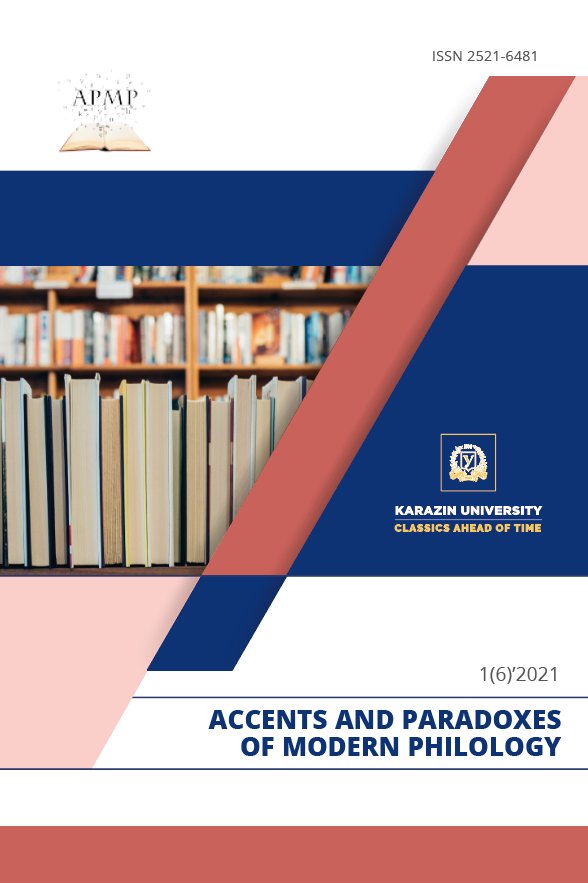LOST IN IDENTITY: A CASE STUDY OF CHIMAMANDA NGOZI ADICHIE’S SELECTED WORKS
Abstract
The article addresses the phenomenon of identity as it is described in modern multicultural literature and analyzes language means applied to actualize the basics of the notion of identity – opposition we-they. The phenomenon of identity, the spotlight of different scientific works due to its immense complexity and multifaceted nature, is of special interest for linguistic studies due to the unique ability of literary texts to reflect the reality and the power of language means to convey certain ideas and messages. The sense of belonging which is as essential for human beings as any other, is strictly determined by the opposition we-they. For the purpose of more profound understanding of this dyad that seems to govern and regulate personal and social interactions between people a number of approaches suggested by different scientists – sociologists, philosophers – have been examined. It seems that the presence of the “Other” predisposes a person’s existence and self-realization as it would be probably impossible to define oneself without recognition from the “Other”. The availability of the “Other” as the required element of our existence, the way we see it, determines the outcome of the interaction at any level. The boundaries that are set by the opposition “we-they” mean striving for recognition. The figure of the “Other” regarded as the enemy is triggered off by a wide range of conceptual metaphors (the metaphor of roots, of mirror, of haziness etc.) verbalized by various language means. Language itself is seen as one of the main means and a powerful tool of setting boundaries and defining oneself and has its specific role in the texts analyzed.
Downloads
References
Berger, P.L., Luckmann, T. (1995). The Social Construction of Reality. A Treatise on Sociology of Knowledge. Moscow: «Medium». (in rus).
Borev, Yu.B. (2002). Esthetics. Moscow: Vysh. shkola. (in rus). Available at: https://www.gumer.info/bibliotek_Buks/Culture/Borev/_08.php [Accessed 21 September 2021].
Borozdina, G.V. (2011). Psychology and pedagogics. Moscow : Yurait. (in rus).
Gasanova, I. M. (2013). Language means of portraying a person’s self-identification in postcolonial novel of XX-XXI centuries. PhD. Abstract. St.-Petersburgh. (in rus).
Grechko, P. K. (2009). Identity – modern. Tsennosti i smysly. № 2. (in rus). Available at: https://cyberleninka.ru/article/n/identichnost-sovremennye-perspektivy. [Accessed 21 September 2021].
Descombes, V. (2020). An interview with V. Descombes. (in ukr). Available at: https://m.tyzhden.ua/Culture/241721 [Accessed 2 September 2021].
Yehupov, M. V. (2015) Identity as a basis of values for modern worldview in national high school. Naukovui visnuk. Seriya «Filosofiya». Kharkiv: KhNPU. № 45. Part 1. P. 143-154 (in ukr).
Simmel, G. (1996). Selected Works. Vol. 2. Moskva: “Yurist”. (in rus).
Komshukova, O. (2019). Existentialism and the problem of the Other: Sartre and Levinas. Monokler. (in rus). Available at: https://monocler.ru/ekzistentsializm-i-problema-drugogo-sartr-i-levinas/ [Accessed 3 October 2021].
Lotman, Yu. M. (1998). The Structure of the Artistic Text in Ob iskusstve. St.-Petersburg: «Iskusstvo - SPb», p. 14-285. (in rus).
Lotman, Yu. M. (1992). Selected articles. Vol. 1. Articles on semiotics and topology of culture. Tallinn: “Aleksandra”. (in rus).
Ricoeur, P. (1995). Narrative Identity. (in rus). Available at: https://www.gumer.info/bogoslov_Buks/Philos/Rik/pov_ident.php [Accessed 16 September 2021].
Shevchuk, D. (2016). V. Descombes. Les embarrass de l’identité – critical review. Krytyka. October, 7-8 (225-226). (in ukr). Available at: https://m.krytyka.com/ua/reviews/klopoty-z-identychnistyu [Accessed 16 September 2021].
Skirbekk, G., Gilje, N. (2000) History of Philosophy. Moskva : Vlados. (in Rrus). Available at: https://pnu.edu.ru/media/filer_public/2012/11/20/history_philosophy.pdf [Accessed 3 October 2021].
Erikson E.H. (1996). Identity: youth and crisis. Moskva : “Progress”. (in rus).
Adichie, Ch.N. (2017). Americanah. London : 4th Estate.
Adichie, Ch.N. (2009a). The thing around your neck. New York, Toronto: Alfred A. Knopf Ebook
Adichie, Ch.N. (2009b). The danger of a single story. TED Talk. [online] Available at: https://www.ted.com/talks/chimamanda_ngozi_adichie_the_danger_of_a_single_story [Accessed 9 September 2021].
Cambridge Dictionary Online. Available at: https://dictionary.cambridge.org/dictionary/ [Accessed 21 September 2021].
Drummond, D.K., Orbe, M.P., 2009. «Who are you trying to be?»: Identity gaps within intraracial encounters. Qualitative Research Reports in Communication, 10 (1), pp. 81-87. DOI:10.1080/17459430903236098
Maslow, A.H. (1954). Motivation and Personality. Harper & Row
Ross, M. L. (2019). Ownership of Language: Diglossia in the Fiction of Chimamanda Ngozi Adichie. Research in African Literatures. Vol. 50, # 1, pp. 111-126. DOI: https://doi.org/10.2979/reseafrilite.50.1.07
Stanford Encyclopedia of Philosophy (2002). Paul Ricoeur. Narrative Identity and the Turn to Selfhood. [online] Available at: https://plato.stanford.edu/entries/ricoeur/#NarrIdenTurnSelf [Accessed 21 September 2021]
Stendhal (1916). The Red and the Black. A chronicle of 1830. Translated by Horace B. Samuel. [online] Available at: https://www.gutenberg.org/files/44747/44747-h/44747-h.htm. [Accessed 9 November 2021]




